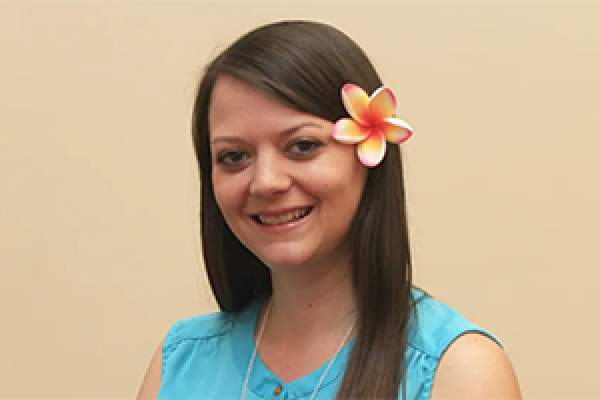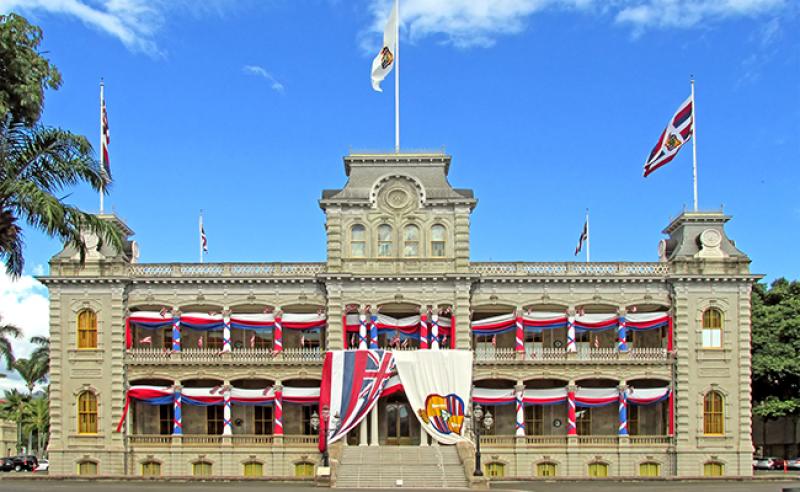Caring for a Royal Residence: Anthropology alum heads curation and education at Hawaii’s Iolani Palace

Anthropology alumna Teresa Valencia '07 has always been passionate about the pursuit of justice. As an undergraduate, she planned to study forensic anthropology to find justice for victims of crimes. After graduation, the idea of law school crossed her mind. But eventually, Valencia decided to become the “rebel within the museum” and work to protect artifacts and champion their return to native tribes. As director of curation and education for Iolani Palace in Honolulu, Valencia oversees the curation and repatriation of Hawaiian artifacts and their exhibition, as well as curriculum development for the museum’s education department.
A career in cultural anthropology
Valencia was drawn to anthropology almost immediately after taking a cultural anthropology class to fulfill a general education requirement.
“After that class, I decided I definitely wanted to do anthropology,” Valencia said.
I have always been really interested in learning how people view the world differently and how our experiences and the culture we’re raised in shape our perception of the world.”
Valencia also appreciated the smaller class sizes she found in the Department of Anthropology and the chance to interact one-on-one with her professors.
“I felt that this was a huge benefit to me as I got to ask more questions and spend more time learning about my professors and their career paths,” she said. “It shaped the way that I thought about using my anthropology degree, as well.”
An internship at the Maidu Museum, a small indigenous museum in California, sealed the deal and cemented Valencia’s desire to pursue cultural anthropology and work in museums.
“That internship experience was a huge eye-opener to me as to what I could do with my degree,” Valencia explained. “It really led me to want to pursue work in the museum field specifically.”
The day after graduation, Valencia drove out to California to start work at the Maidu museum full time. Throughout her career, Valencia has worked in various museums and cultural sites in California, including Alcatraz, where she conducted tours on the Native American occupation and protest of the island.
Eventually, Valencia decided to obtain her graduate degree so she could pursue leadership positions in museums. While earning both her master’s in museum studies and her MBA, Valencia had the opportunity to work for the Exploratorium, the Asian Art Museum, and as her final internship for credit, at Iolani Palace in Hawaii.
A focus on shared authority
In the late 1800s, Iolani Palace served as the official royal residence of King Kalakaua and his sister and successor, Queen Liliuokalani. The palace was a symbol of the strength and sovereignty of the Hawaiian Kingdom and its role on the international stage. It continues to hold an important place in the hearts of the people of Hawaii today.

Iolani Palace adorned with bunting in honor of His Majesty King Kalakaua's birthday.
In her role now as director of curation and education of the palace, Valencia works with native groups to facilitate the care of Hawaiian artifacts and the interpretation of their history.
“More than me deciding what content should be on an exhibit panel, I work to ensure we have the resources to have Hawaiian voices be the deciders,” Valencia said. “The focus is on shared authority.”
The concept of shared authority is something Valencia first encountered while interning at the Maidu Museum. Valencia explained that museums began as very colonial institutions, where objects, often looted or stolen from their cultures of origin, were placed on display. Historically, the policies for care, exhibition and interpretation were also written solely from a Western perspective. The idea of shared authority, as well as traditional care practices, when dealing with artifacts is an attempt to de-colonize the museum field and, in Hawaii, to re-nationalize.
“Being an outsider and not Hawaiian myself, I feel that the way exhibits are designed, as well as their content, should be driven by those whose culture is being interpreted,” Valencia said. “In this role, I am able to put the practice of shared authority into action.”
.dailypost {background-color:#000; padding:30px;color:#fff;font-family:"capita";font-size: 1.25em;font-weight: 400;} .clicktotweet {float: right; text-align:right;}
.@OSUAnthro alum oversees curation and repatriation of Hawaiian artifacts at @IolaniPalaceHI.
Valencia credits her anthropology degree at Ohio State with broadening her mindset and teaching her to value different viewpoints on the job.
“There are many ways to view the same thing,” Valencia said. “With respect to the care of an object, it’s not just the Western perspective of care that matters, such as keeping it at a certain temperature. The way that the culture thinks the object should be cared for also carries weight.”
For students hoping to pursue museum work, Valencia recommends patience and reminds them to work on their cultural competence.
“When you’re just starting out, you need to value the time to learn as much as you can,” she said. “Especially if you want to work with a culture that is not your own, it’s important to understand your role is not to talk and to teach, but to listen and to learn."
